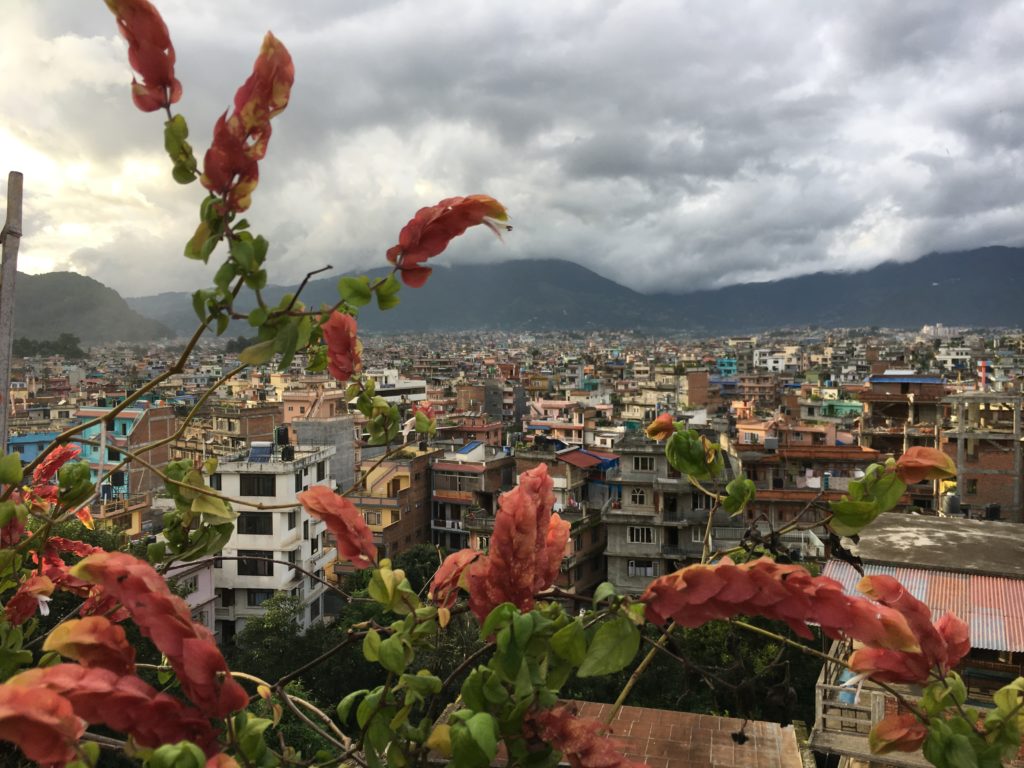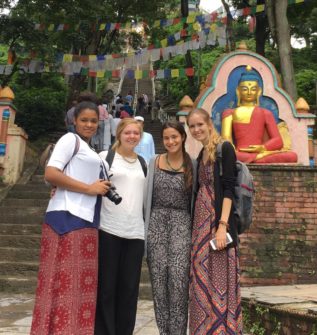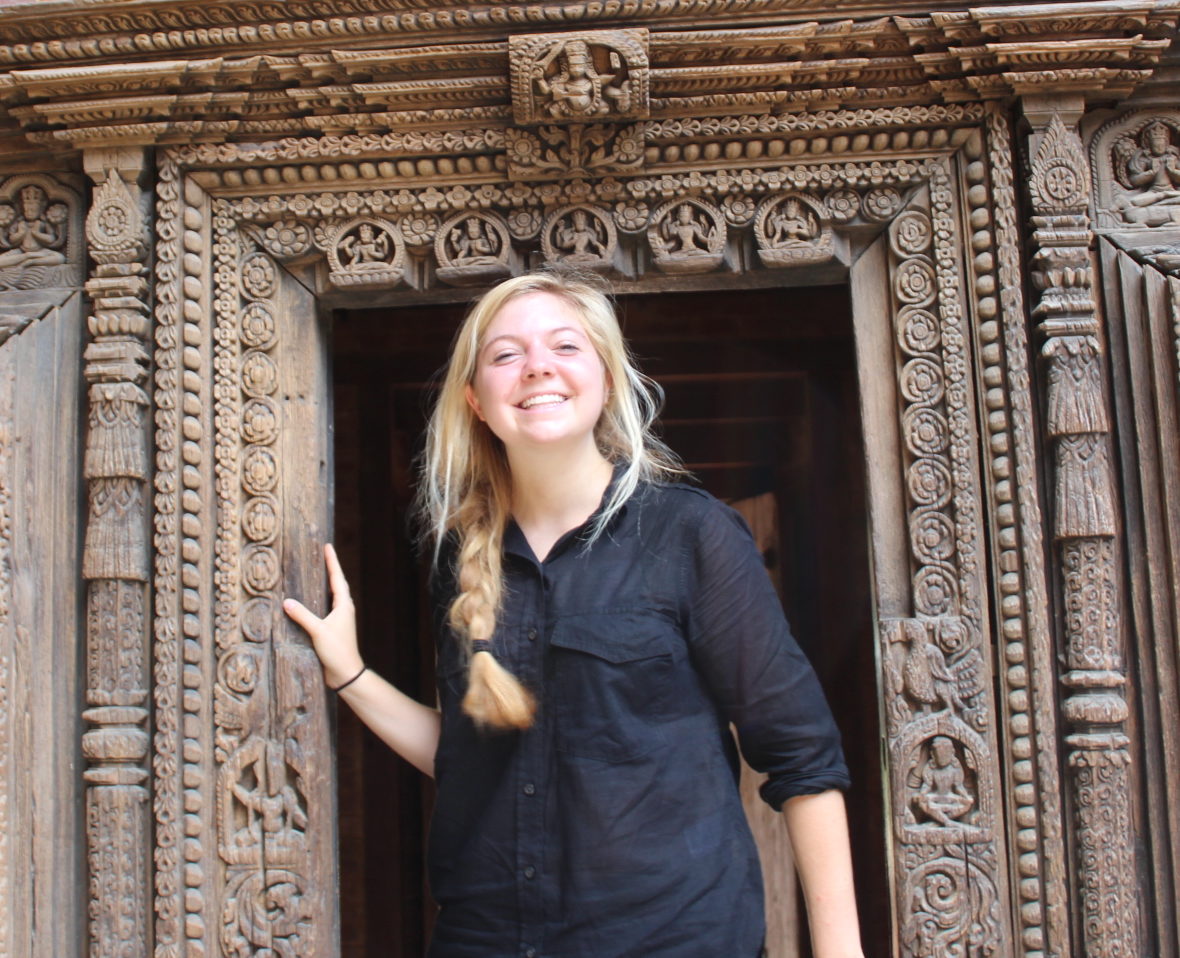
A little more than a week into the Madrasa Discourses summer intensive in Kathmandu, I sat on the balcony of our hotel overlooking the Kathmandu Valley while catching up on the readings for the day’s lecture. After eight days of intense material and discussion, I was both mentally and physically exhausted. The students from India and Pakistan, graduates of Islamic instructional schools called madrasas, asked what seemed to be nonstop questions. About the West, about Christianity and Catholicism, about living in such a secular state, about the average American’s opinion of Muslims, about the American political system and our new president, and how I felt about the conflicts in the Middle East. I felt tested in my knowledge of the things I suspected I should know most intuitively: my country, my daily life, and the faith I was raised in for 20 years. As one of the first Americans these madrasa students had ever encountered and conversed with, I felt an enormous pressure to be a positive but accurate representative for the impossible-to-represent demographic of “American.”
I was particularly excited for that morning’s lecture and discussion. Dr. Leela Prasad, a professor of religious studies at Duke University, would be talking about “religion” and the “everyday” in a world of plural cosmologies. I did not yet know exactly what she meant, but I knew I was intrigued. The first reading was a section of a book by Ramchandra Gandhi titled “Advaita: Meditations on the Truth of India,” and as I read through these profound and thoughtful words about the ancient Hindu philosophy, I stopped on one sentence that dwelled in my mind for the remainder of the intensive, and ever since. “Tragedy”, Ramchandra Gandhi writes, “lies in our regarding anything or anyone as ‘other’ than ourselves” (70).

This statement called for immediate reflection. It had been easy, before this point, to see only the things that made the Americans, the Indians, and the Pakistanis different. We preferred to eat at different times; we had different conceptions of punctuality; we had so many questions for each other about the differences in our cultures, our daily lives, our states, and our faiths. But remove this idea of “otherness” and how are we the same? One similarity was readily apparent: we are all students. We all want to learn. As many questions as the Madrasa graduates asked me, I asked them. I learned, in two short weeks, more about India, Pakistan, eastern education, and Islam than I could have hoped or imagined. I thought about how easy it was to talk to them. Despite some difficulty understanding each other’s accents, every single graduate’s English skills impressed me, and they were not in the least bit intimidating. They responded to what seemed like the most basic and naïve questions I asked with patience, genuine warmth, and kindness. We had immense respect for each other, and this was vital for the more difficult or tense conversations we had.
A majority of the time, however, our conversations were lighthearted and humorous. We shared classic jokes from one another’s childhoods with each other, and it was rather refreshing to tell “why did the chicken cross the road” to someone who had never heard it before. We talked about each other’s families and how much we all missed them. We bonded over how new and different Nepali culture was to all of us, and we all took selfies as we toured incredible sites of the beautiful and culturally rich country.
I thought about the first evening, when I met the only non-American female in the program, sporting a face- and form-covering niqab and abaya. She referred to me as her “new sister.” This was the attitude she, and every Madrasa graduate, carried with them throughout the program. So as I sat on that porch, reflecting on how this ancient Hindu concept of Advaita had relevance in the experiences of Americans, Indians, Pakistanis, Christians, Muslims and students in Kathmandu, Nepal, I felt immense gratitude. It became increasingly clear to me that we really were much more similar than different. We are all trying to find our place, and our guiding principles and purpose, in a world that seems plagued with political unrest and senseless violence. In an increasingly secular and pluralistic world, coexistence is the goal for many peace builders. This experience made clear that not only is tolerance possible, so is harmony.
None of this can be achieved, however, if we hold to this idea of “otherness.” The simplest and most effective way to challenge it is to have personal interactions with people from different countries, cultures, and faiths. In these interactions, our similarities seem much stronger than our differences, and as a result it is easier to talk honestly and constructively about the barriers we face on our way to living in a peaceful world. Every person is unique, but we have a shared humanity stronger than our individual identities which makes communication possible. Two short weeks was nowhere near enough time to address any of the problems we faced in a complete manner. But we began conversations about secularism, modernity, “truth,” pluralism, authority, and gender equality that will continue throughout the year. I have already experienced a change in my own thinking and approach to peace building. When we see one another as human, our differences no longer seem insurmountable. I arrived in Kathmandu nervous, unsure of what to expect from 25 strangers of India and Pakistan who lived very different lives and studied and practiced a faith I knew little about. I left two weeks later after saying goodbye to my 25 new brothers and sisters and headed back to Notre Dame with renewed hope in intercultural and interfaith dialogue as a means for peace.

